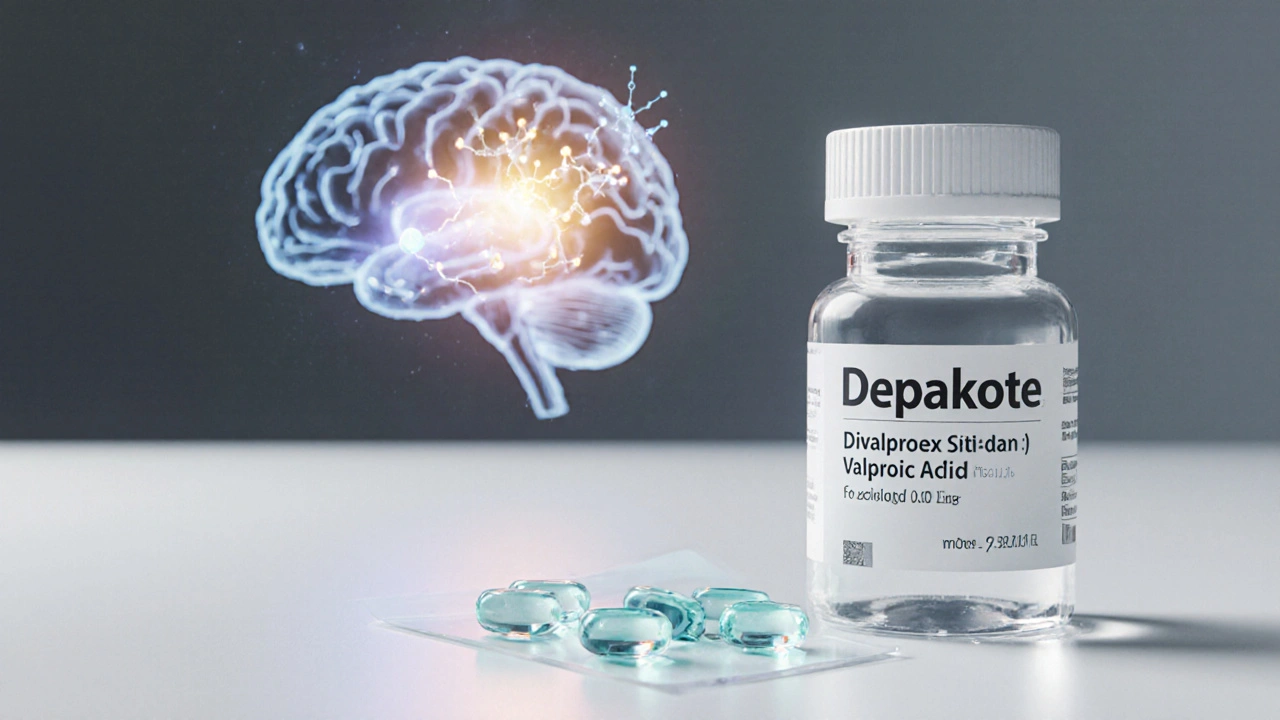Depakote (Divalproex) vs Common Alternatives: Detailed Comparison
Medication Decision Aid: Depakote Alternatives
Personalized Medication Recommendations
Answer a few questions about your situation to find which alternatives to Depakote might work best for you. This tool uses the information from the article to provide personalized recommendations based on your specific needs.
If you or a loved one is taking Depakote comparison, you probably wonder whether there’s a safer, cheaper, or more effective option out there. Depakote (divalproex sodium) has been a go‑to for seizure control, bipolar disorder, and migraine prevention for decades, but it’s not the only player. This guide breaks down how Depakote stacks up against the most frequently prescribed alternatives, so you can weigh benefits, side‑effects, and practical concerns before making a change.
What is Depakote (Divalproex Sodium)?
Depakote is a brand‑name formulation of divalproex sodium, a pro‑drug that converts to valproic acid in the body. It belongs to the class of anticonvulsants known as fatty acids. The medication works by increasing gamma‑aminobutyric acid (GABA) levels, stabilizing neuronal firing and dampening mood swings. FDA‑approved indications include generalized tonic‑clonic seizures, focal seizures, bipolar I disorder (manic episodes), and migraine prophylaxis.
Key Attributes of Depakote
- Typical dose: 10‑30mg/kg per day for seizures; 750‑2000mg total daily for bipolar maintenance.
- Common side effects: nausea, weight gain, tremor, hair loss, and elevated liver enzymes.
- Pregnancy risk: Category D - high teratogenic potential (neural‑tube defects).
- Monitoring: Baseline and periodic liver function tests, serum ammonia, and complete blood count.
Why Look at Alternatives?
Many patients stop Depakote because of weight gain, liver concerns, or the dreaded pregnancy warnings. Insurance formularies sometimes favor generic options with lower copays. Others need a medication that targets specific seizure types or mood symptoms better. Below is a quick snapshot of the most common substitutes.
Overview of Frequently Used Alternatives
Lamotrigine is a phenyltriazine anticonvulsant that blocks voltage‑gated sodium channels, making it effective for focal seizures and bipolar depression.
Topiramate is a sulfamate‑substituted monosaccharide that enhances GABA activity and inhibits excitatory glutamate receptors, used for seizures and migraine prevention.
Carbamazepine is an iminostilbene that stabilizes hyperexcited nerve membranes, widely prescribed for focal seizures and trigeminal neuralgia.
Gabapentin is a gamma‑aminobutyric acid analogue that binds to the α2δ subunit of voltage‑gated calcium channels, useful for partial seizures and neuropathic pain.
Oxcarbazepine is a keto‑analogue of carbamazepine with a similar mechanism but fewer drug interactions.
Levetiracetam is a pyrrolidine derivative that modulates synaptic vesicle protein SV2A, effective for a broad range of seizure types.
Valproic Acid (generic) is the active form of divalproex; it shares the same efficacy profile but is typically cheaper than the branded Depakote.
Side‑by‑Side Comparison
| Medication | Primary Indications | Typical Daily Dose | Common Side Effects | Pregnancy Category | Key Monitoring |
|---|---|---|---|---|---|
| Depakote | Generalized seizures, bipolar mania, migraine prophylaxis | 10‑30mg/kg (seizures) / 750‑2000mg (bipolar) | Nausea, weight gain, tremor, hair loss, liver enzyme rise | D (high teratogenic risk) | Liver function, serum ammonia, CBC |
| Lamotrigine | Focal seizures, bipolar depression | 25‑500mg per day (titrated) | Rash (rare SJS), dizziness, insomnia | C | Skin monitoring for rash, CBC if combined with valproate |
| Topiramate | Partial seizures, migraine prevention | 25‑200mg per day (titrated) | Paresthesia, weight loss, cognitive slowing | C | Renal function, metabolic acidosis |
| Carbamazepine | Focal seizures, trigeminal neuralgia | 200‑1200mg per day | Dizziness, hyponatremia, rash | C | Liver enzymes, CBC, electrolytes |
| Gabapentin | Partial seizures, neuropathic pain | 900‑3600mg per day (divided) | Somnolence, edema, weight gain | B | Renal function (dose adjustment) |
| Oxcarbazepine | Focal seizures | 600‑2400mg per day | Dizziness, hyponatremia, rash | C | Serum sodium, liver enzymes |
| Levetiracetam | Broad‑spectrum seizures | 500‑3000mg per day | Irritability, fatigue, dizziness | C | No routine labs required unless renal impairment |
| Valproic Acid | Same as Depakote - seizures, bipolar, migraine | \n15‑60mg/kg per day | Similar to Depakote - GI upset, weight gain, hepatotoxicity | D | Liver function, serum ammonia, CBC |
When Might an Alternative Beat Depakote?
Pregnancy planning: If you’re trying to conceive or already pregnant, drugs with a lower teratogenic profile-like lamotrigine or levetiracetam-are usually preferred.
Weight concerns: Topiramate often causes weight loss, making it attractive for patients who struggle with Depakote‑induced weight gain.
Drug interactions: Carbamazepine and oxcarbazepine are strong enzyme inducers, which can lower levels of other meds. If you’re on multiple psychotropics, levetiracetam’s minimal interaction profile may be a relief.
Side‑effect tolerance: Some patients can’t handle the tremor or hair loss associated with Depakote. Gabapentin’s side‑effect slate is milder, though it can cause swelling.
Cost considerations: Generic valproic acid usually costs less than the brand‑name Depakote, while older generics like carbamazepine and gabapentin are widely covered by insurance.

Decision‑Making Checklist
- Is pregnancy possible now or in the near future?
- Do you have liver disease or a history of elevated enzymes?
- Are you prone to weight gain, or do you need weight loss support?
- What other medications are you taking that could interact?
- What’s your insurance’s formulary preference?
Answering these questions helps narrow down whether a switch makes sense and which alternative aligns best with your health goals.
How to Transition Safely
Never stop Depakote abruptly. Tapering schedules vary by dose but typically involve reducing the total daily amount by 25% every 1‑2 weeks while introducing the new drug at a low dose. Your prescriber will monitor serum levels (especially when swapping for another sodium valproate) and watch for breakthrough seizures or mood destabilization.
Bottom Line: Tailor the Choice to Your Profile
Depakote remains a powerful, versatile option, yet it’s not one‑size‑fits‑all. If teratogenic risk, weight gain, or liver health are red flags, consider lamotrigine, levetiracetam, or topiramate. For patients focused on cost and broad seizure coverage, generic valproic acid or carbamazepine may be suitable. Always discuss risks, benefits, and monitoring plans with your neurologist or psychiatrist before making any changes.
Frequently Asked Questions
Can I switch from Depakote to lamotrigine without a wash‑out period?
Lamotrigine and Depakote don’t require a formal wash‑out because they don’t interact adversely, but a gradual taper of Depakote combined with slow titration of lamotrigine (starting at 25mg) is recommended to avoid breakthrough seizures.
Is generic valproic acid as effective as Depakote?
Yes. Both deliver the same active compound; the difference is mainly branding and price. Some patients report slightly higher GI tolerance with the generic, but therapeutic outcomes are equivalent.
Which alternative has the lowest risk of birth defects?
Lamotrigine (Category C) and levetiracetam (Category C) carry the lowest documented teratogenic risk among the listed options. Both have been studied in large pregnancy registries with relatively favorable outcomes.
Will switching affect my mood stability if I take Depakote for bipolar disorder?
Possibly. Depakote stabilizes mania well, while lamotrigine targets depressive episodes more than mania. If mania control is critical, a combination or a different mood stabilizer like lithium may be considered during the switch.
How often should liver function be checked after changing meds?
For Depakote or valproic acid, baseline labs are required, then repeat at 1 month, 3 months, and annually. Alternatives such as levetiracetam or gabapentin usually need no routine liver monitoring unless you have pre‑existing liver disease.







14 Comments
Taylor Van Wie
October 12, 2025 at 19:44
Depakote may have been a staple for years, but it’s a relic that keeps dragging us back into a cycle of side‑effects and monitoring headaches. In this day and age the U.S. should push for newer, safer options that don’t threaten unborn children or overload the liver. The drug’s teratogenic risk is unacceptable when we have lamotrigine or levetiracetam on the shelf. It's high time policymakers cut the subsidy and let clinicians steer patients toward better choices.
carlee Lee
October 12, 2025 at 20:17
Depakote works for some, but if weight gain or liver concerns are a deal‑breaker, topiramate or lamotrigine are solid alternatives. They also tend to be easier on insurance formularies.
chuck thomas
October 12, 2025 at 20:51
When you weigh efficacy against side‑effect profiles, the picture becomes nuanced. Valproic acid’s broad seizure coverage is undeniable, yet its impact on hormone balance and cognition can’t be ignored. Switching to levetiracetam often spares patients from metabolic nightmares, while still delivering robust seizure control. For bipolar patients, lamotrigine shines in preventing depressive relapse, though it doesn’t tame mania as aggressively as valproate. Ultimately, individual comorbidities dictate the optimal path.
Gareth Pugh
October 12, 2025 at 21:24
Think of medication choice as a palette-each drug adds a different hue. Lamotrigine paints a calm, steady stroke, while topiramate splashes a weight‑loss shade that many patients crave. If you need a migraine shield, gabapentin offers gentle relief without the heavy liver load.
Illiana Durbin
October 12, 2025 at 21:57
From a clinical standpoint, monitoring frequency is a key factor. Depakote demands regular liver panels and ammonia checks, which can be burdensome for patients with limited access to labs. Alternatives like levetiracetam typically require no routine labs, simplifying follow‑up and reducing healthcare costs.
Michael Daun
October 12, 2025 at 22:31
yeah thats a good point u dont need to be stuck in labs all the time cant be why people skip med
Sayam Masood
October 12, 2025 at 23:04
One might argue that the ontology of therapeutic substitution extends beyond mere pharmacodynamics; it interrogates the epistemic trust between prescriber and patient. When the clinician acknowledges the metabolomic ramifications of valproate, the patient’s agency is restored, fostering adherence.
Jason Montgomery
October 12, 2025 at 23:37
Totally agree-keeping things chill and open makes the whole switch feel less scary. I’ve seen folks ease into levetiracetam with just a quick chat and a simple taper plan.
Wade Developer
October 13, 2025 at 00:11
From a regulatory perspective, the FDA’s categorization of Depakote as Pregnancy Category D imposes significant liability on prescribers. This status compels a more rigorous justification for continued use, especially when alternatives with Category C or lower are available. Moreover, insurance formularies increasingly flag valproate for prior authorization, adding administrative friction. Clinicians therefore must balance therapeutic benefit against both clinical risk and systemic barriers.
rama andika
October 13, 2025 at 00:44
Oh sure, let’s just ignore the mountain of evidence that valproate can cause neural‑tube defects and pretend it’s no big deal-because who cares about babies, right?
Kenny ANTOINE-EDOUARD
October 13, 2025 at 01:17
When evaluating the switch from Depakote to an alternative, the first step is a comprehensive assessment of the patient’s current clinical status. Identify whether the primary indication is seizure control, bipolar mood stabilization, or migraine prophylaxis, as each therapeutic goal may favor a different substitute. For seizure control, levetiracetam offers a broad spectrum of efficacy with minimal drug‑drug interactions and a favorable side‑effect profile. In bipolar disorder, lamotrigine is particularly effective for preventing depressive episodes, though it may need to be combined with other agents to cover manic phases. Migraine sufferers often benefit from topiramate’s weight‑loss side effect, which can be an added advantage for those concerned about Depakote‑induced weight gain. Next, evaluate hepatic function; patients with elevated liver enzymes or a history of liver disease should avoid valproate derivatives due to hepatotoxic risk. Renal function is less of a concern with most alternatives, but dose adjustment may be required for levetiracetam in cases of impaired clearance. Consider reproductive plans-lamotrigine and levetiracetam are both considered safer in pregnancy, with lower teratogenic potential compared to valproate. Insurance coverage also plays a pivotal role; generic levetiracetam and lamotrigine are widely formulary‑preferred, reducing out‑of‑pocket costs. Discuss tapering strategies, typically reducing Depakote by 25 % every one to two weeks while initiating the new medication at a low dose to monitor tolerability. Monitor for breakthrough seizures or mood destabilization during the transition, adjusting the titration schedule as needed. It is essential to educate the patient about potential side effects of the new drug, such as lamotrigine’s rash risk, which warrants prompt medical attention. Regular follow‑up appointments, either in‑person or via telehealth, help ensure a smooth transition and address any emergent concerns. Documentation of the rationale for change, including side‑effect burden and patient preference, is crucial for compliance and medico‑legal purposes. Finally, reinforce that any medication change should be a shared decision, emphasizing the patient’s autonomy and informed consent throughout the process.
Jo D
October 13, 2025 at 01:51
Wow, that was a thrilling deep‑dive, really shook my world.
Sinead McArdle
October 13, 2025 at 02:24
Thank you for the thorough overview; the step‑by‑step guidance will be useful for clinicians navigating medication changes.
Katherine Krucker Merkle
October 13, 2025 at 02:57
Great discussion, everyone! It really shows how many factors play into picking the right alternative, and I appreciate the practical tips shared.